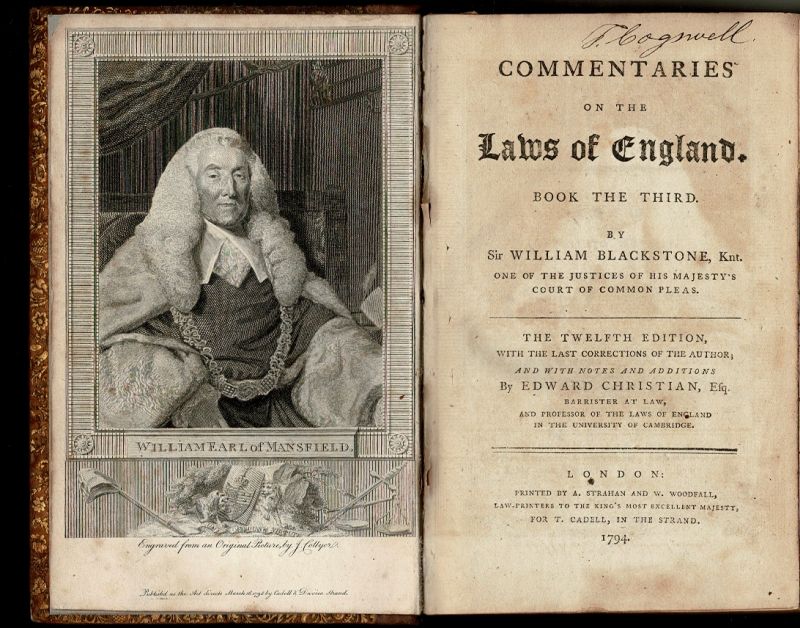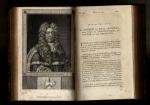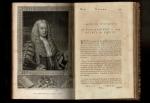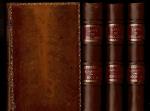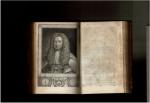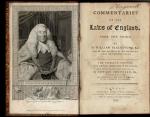Blackstone, Commentaries on the Laws of England by Sir William Blackstone, Knt.
Commentaries on the Laws of England by Sir William Blackstone, Knt. One of the Justices of his Majesty’s Court of Common Pleas. The Twelfth Edition, with the Last Corrections of the Author; and with Notes and Additions by Edward Christian, Esq.
The Rare Edward Christian Edition. Four Volumes (complete set). London, A. Strahan and W. Woodfall, Law-Printers to the King’s most excellent Majesty, for T. Cadell, in the Strand, 1793,1794,1795. Octavo. Pagination: Volume I: X, [6], III, [1], 487 pages / Volume II: [8], 520, XX pages / Volume III: Frontispiece-Portrait, [8], 455, XXXV, [1], 16 pages with three more portraits bound-in / Volume IV: [8], 443, VIII, [72] pages. With four Portraits in total and one large folding table showing the “Table of Descents”. The Portraits which are bound into Volume III of the set are: I. Portrait of British Judge “William Murray, 1st Earl of Mansfield” / II. Portrait of “Lord Chief Baron Gilbert” [Sir Jeffrey Gilbert, Lord Chief Baron of the Exchequer in both Ireland and England] / III. Portrait of english Judge and Member of Parliament, Sir John Comyns, Knt. / IV. Portrait of english lawyer and Lord High Chancellor Philip Earl of Hardwicke. Hardcover / Original edition of the 18th century, rebacked by a master-binder with 20th century leather-spines in the style of the 18th century. This extremely rare edition Edward Christian – Edition of Blackstone, with the last corrections before Blackstone’s death, published for the first time by Edward Christian in the years 1793-1795. This set is used with some minor spotting to pages but overall a very desirable and important version of Blackstone’s commentaries on the Laws of England. [The set comes also with a stunning Limited Edition of the four-volume- Reprint of the First Edition of Blackstone’s Commentaries (1766)].
Sir William Blackstone SL KC (10 July 1723 – 14 February 1780) was an English jurist, judge and Tory politician of the eighteenth century. He is most noted for writing the Commentaries on the Laws of England. Born into a middle-class family in London, Blackstone was educated at Charterhouse School before matriculating at Pembroke College, Oxford in 1738. After switching to and completing a Bachelor of Civil Law degree, he was made a Fellow of All Souls, Oxford on 2 November 1743, admitted to Middle Temple, and called to the Bar there in 1746. Following a slow start to his career as a barrister, Blackstone became heavily involved in university administration, becoming accountant, treasurer and bursar on 28 November 1746 and Senior Bursar in 1750. Blackstone is considered responsible for completing the Codrington Library and Warton Building, and simplifying the complex accounting system used by the college. On 3 July 1753 he formally gave up his practice as a barrister and instead embarked on a series of lectures on English law, the first of their kind. These were massively successful, earning him a total of £453 (£65,000 in 2018 terms), and led to the publication of An Analysis of the Laws of England in 1756, which repeatedly sold out and was used to preface his later works.
On 20 October 1758 Blackstone was confirmed as the first Vinerian Professor of English Law, immediately embarking on another series of lectures and publishing a similarly successful second treatise, titled A Discourse on the Study of the Law. With his growing fame, Blackstone successfully returned to the bar and maintained a good practice, also securing election as Tory Member of Parliament for the rotten borough of Hindon on 30 March 1761. In November 1765 he published the first of four volumes of Commentaries on the Laws of England, considered his magnum opus; the completed work earned Blackstone £14,000 (£1,787,000 in 2018 terms). After repeated failures, he successfully gained appointment to the judiciary as a Justice of the Court of King’s Bench on 16 February 1770, leaving to replace Edward Clive as a Justice of the Common Pleas on 25 June. He remained in this position until his death, on 14 February 1780.
Blackstone’s legacy and main work of note is his Commentaries. Designed to provide a complete overview of English law, the four-volume treatise was repeatedly republished in 1770, 1773, 1774, 1775, 1778 and in a posthumous edition in 1783. Reprints of the first edition, intended for practical use rather than antiquary interest, were published until the 1870s in England and Wales, and a working version by Henry John Stephen, first published in 1841, was reprinted until after the Second World War. Legal education in England had stalled; Blackstone’s work gave the law “at least a veneer of scholarly respectability”. William Searle Holdsworth, one of Blackstone’s successors as Vinerian Professor, argued that “If the Commentaries had not been written when they were written, I think it very doubtful that [the United States], and other English speaking countries would have so universally adopted the common law.” In the United States, the Commentaries influenced Alexander Hamilton, John Marshall, James Wilson, John Jay, John Adams, James Kent and Abraham Lincoln, and remain frequently cited in Supreme Court decisions. (Wikipedia)
_________________________________________________________________________________________
Edward Christian (3 March 1758 – 29 March 1823) was an English judge and law professor. He was the older brother of Fletcher Christian, leader of the mutiny on the Bounty.
Life
Edward Christian was one of the three sons of Charles Christian of Moorland Close and of the large Ewanrigg Hall estate in Dearham, Cumberland, an attorney-at-law descended from Manx gentry, and his wife Ann Dixon.
Charles’s marriage to Ann brought with it the small property of Moorland Close, “a quadrangle pile of buildings … half castle, half farmstead.” Charles died in 1768 and Edward’s mother, Ann, proved herself irresponsible with money. By 1779, Ann had run up a debt of nearly £6,500 (equal to £1,103,433 today), and faced the prospect of debtors’ prison. Moorland Close was lost and Ann and her younger children were forced to flee to the Isle of Man, where English creditors had no power. The three elder Christian sons managed to arrange a £40 (equal to £6,790 today) per year annuity for their mother, allowing the family to live in genteel poverty. His mother, Ann, died on the Isle of Man in 1819.
Christian attended St Bees School and went up to Peterhouse, Cambridge in 1775, but migrated to St John’s College in 1777, graduating as third wrangler in 1779. From 1781 to 1782, Edward Christian was Headmaster at Hawkshead Grammar School. He left his job at the school to go to Cambridge University.
While at Cambridge, he forged a friendship with William Wilberforce. He was admitted to Gray’s Inn on 5 July 1782. In 1788, Christian was appointed Downing Professor of the Laws of England at the University of Cambridge, although the chair was only founded along with Downing College in 1800. He held the professorship in conjunction with a fellowship of Downing until his death in 1823. He was also law professor at the East India Company College from 1806 to 1818.
Christian was Chief Justice of the Isle of Ely and was one of the presiding judges at the Ely and Littleport riot Special Commission assizes at Ely in 1816.
Works
In 1794, Stephen Barney, counsel to the mutineer William Muspratt, at the urging of Edward Christian, published his version of the Minutes of the Bounty Court-Martial, and included an Appendix written by Edward Christian. In it, Edward did not try to excuse his brother Fletcher’s conduct, but citing his interviews with several of the people involved (none directly), and listing the names and addresses of several prominent people as witnesses to these interviews, he recounted several of the excesses of William Bligh, Commander of the Bounty. At the time of the publication of the Minutes and Appendix, the public’s only published source of information about the mutiny were Bligh’s own A Narrative of the Mutiny on the Bounty, published in 1790, and A Voyage to the South Sea, published in 1792. With the publication of the Appendix, the tide of public opinion began to turn against Bligh. Indeed, Bligh responded by publishing An Answer to Certain Assertions Contained in The Appendix to a Pamphlet, entitled… etc., etc., to which, Edward Christian promptly published A Short Reply to Capt. William Bligh’s Answer, which only served to fan the flames.
The process was aided by the efforts of the family of Peter Heywood, a midshipman on the Bounty, and others, but many attribute the source of William Bligh’s bad reputation, to this day, to Edward Christian’s Appendix. It is believed by many that Edward Christian’s impetus for both the Minutes and the Appendix, were a letter from, and a subsequent meeting with, Peter Heywood, after the latter’s pardon.
Christian is also known for producing the twelfth edition of the Commentaries on the Laws of England, including Christian’s notes and additions to what William Blackstone had written. The twelfth edition was published in several volumes from 1793 to 1795. (Wikipedia)
- Keywords: English Law · English Legal History · Law · Law – Rare
- Language: English
- Inventory Number: 32172AB
EUR 2.800,--
© 2025 Inanna Rare Books Ltd. | Powered by HESCOM-Software




